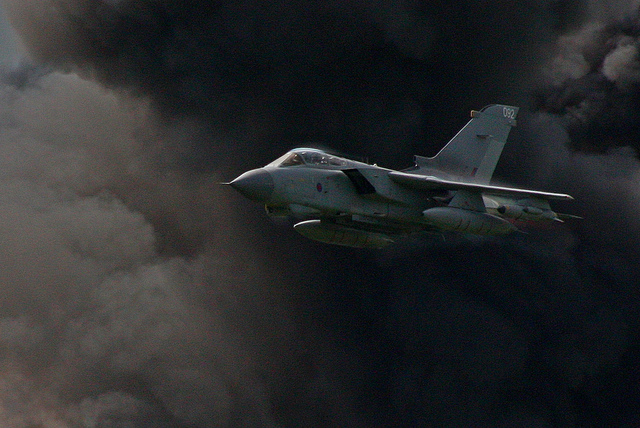Like this article? rabble is reader-supported journalism. Chip in to keep stories like these coming.
In October 2014, the Harper government majority in the House of Commons voted in favour of a Canadian bombing mission in Iraq. The Globe and Mail reported at that time, “Liberal Leader Justin Trudeau said he sees no reason to vote in favour of Canadian air strikes, using an innuendo to deride the eventual deployment of Canada’s “aging warplanes.” ‘Why aren’t we talking more about the kind of humanitarian aid that Canada can and must be engaged in, rather than, you know, trying to whip out our CF-18s and show them how big they are,’ Mr. Trudeau said, with a flick of the hand, after a speech in Ottawa.”
In the lead-up to the October 19, 2015 general election, the Liberals promised that in government they would “refocus Canada’s military contribution in the region on the training of local forces.”
By November 23, 2015, The Globe and Mail reported, “CF-18s have launched at least 16 strikes since the Oct. 19 election and 193 in the region since last fall. Mr. Trudeau has not set a firm date for withdrawing Canada’s fighters. He has said only that they would be recalled by March 31, 2016.”
That article highlighted:
“An air strike on Nov. 19, one month after the Liberals were elected, was intended to destroy what the Canadian military said was an Islamic State bomb-making factory in Mosul. But local Iraq media reports, which included video and photographic evidence of collateral damage, say the attack on the bomb plant also damaged a dairy factory next door, killing between 5 and 13 people and injuring more than a dozen. …This is not the first allegation that Canadian military’s air strikes have killed civilians. In January [2015], an English-speaking Kurdish Peshmerga fighter told the U.S. military that as many as 27 civilians died during aerial bombardment by a Canadian pilots.”
Then on February 8, 2016, Trudeau announced the CF-18s would be withdrawn from bombing missions in Iraq and Syria. (The Harper government had extended Canada’s air war to Syria in March 2015.) The Financial Post noted, “The mission had been due to end by March [2016 anyway] but could have been extended [had the Harper government been re-elected].”
Significantly, the Toronto Star’s national affairs columnist Thomas Walkom pointed out:
“Forget the fighter jets. Yes, the Trudeau government is withdrawing the six CF-18s that had been used to bomb the militants — also known as ISIS — in Iraq and Syria. But with the U.S. and 12 other nations committed to the air war, there’s still plenty of bombing going on. The problem has never been a dearth of warplanes. Rather it has been the difficulty in finding civilian-free targets to attack. The real story from [Trudeau’s] announcement in Ottawa is that Canada is sinking more, not less, into this war.”
Walkom highlighted that the Trudeau government committed $1.6 billion over the next three years to this mission, sent more soldiers to the region, tripled the number of special forces troops in northern Iraq, and that those special forces on the front lines could initiate fire if they or their allies are threatened. CTV also noted, “One refuelling plane and two surveillance aircraft will continue to participate.”
And just last week, Montreal-based historian and journalist Michael Petrou wrote in iPolitics that:
“Canadian trainers are calling in airstrikes, Canadian planes are scouting targets, and Canadian officers are on the ground in Baghdad working with the Iraqi military and other members of the U.S.-led international coalition. [And yet] the Trudeau government still publicly clings to the fiction that this isn’t a combat mission.”
It was also last week that the Chilcot Inquiry, a British public inquiry into that country’s role in the 2003 invasion of Iraq, was released. It found that the lack of post-war planning significantly contributed to the emergence of ISIS. Prior to the release of this report, Trudeau’s foreign affairs minister, Stephane Dion, told the House of Commons, “Our goal isn’t only to abolish this horrible terrorist group, but also to ensure that it does not re-emerge later through another group and under another name. So we need to create conditions conducive to lasting stability and peace.”
Let us hope that the Trudeau government, unlike the Tony Blair Labour government in 2003, really does have a plan beyond its ongoing support for coalition bombing missions. As of January 10, 2016, the United States, Canada, Great Britain, France, Australia and several other countries have carried out 6,341 airstrikes in Iraq and 3,219 in Syria. Media reports suggest ISIS has experienced several military losses and so has resorted to guerilla-style tactics, including the July 3 car bomb attack in downtown Baghdad that killed 292 people and wounded more than 200 others.
Photo: Gavin Smith/flickr
Like this article? rabble is reader-supported journalism. Chip in to keep stories like these coming.



